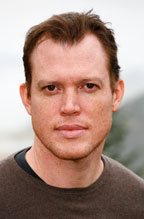Vagabonding

Author: Rolf Potts
Published: original version 2002, this version 2016 (209 pages)
Started reading: 9.October.2016
Finished reading: 29.October.2016
Brief description
Finishing Vagabonding: An Uncommon Guide to the Art of Long-Term World Travel today makes it 20 days since I completed my last book. The rhythm of one-per-week may have been slightly disrupted.
Vagabonding, by travel writer Rolf Potts, calls for long-term travel with an open-minded outlook. Tim Ferriss highly recommended it in The 4-Hour Workweek, and also hosted Potts on his podcast. Whether that endorsement was the cause or effect, Vagabonding has, by 2016, sold more than 100, 000 copies, which places it in the successful minority of books ever published.

Rolf: complete vagabond
It took me three weeks to complete. The reason was not that it’s a long or particularly dense book – it’s only 209 A5-sized pages of legible prose. It’s that I found it profoundly boring.
The notions of extended travel, of not succumbing to tourist mentalities, of not being precious or luxurious, of engaging non-judgementally with local cultures – the spirit and behaviours of ‘vagabonding’ – might be insightful to some. But to well-travelled Australians, they feel kind of obvious.
As a result, to read Vagabonding is to drag yourself from one vague motherhood or rainbow statement to another, until you finally emerge at the other side spiritually unenlightened, wondering what all the hype was about. Here are some examples pulled at random from the book, all delivered with Potts’ air of profundity:
On vagabonding: “In this way, vagabonding is like a pilgrimage without a specific destination or goal – not a quest for answers so much as a celebration of the questions, an embrace of the ambiguous, and an openness to anything that comes your way.”
On meeting people: “Indeed, in leaving home, you’ll find that the most intriguing experiences and eye-opening encounters come from people whose lifestyles and backgrounds are completely different from your own.”
On exploring other cultures: “To truly interact with people as you travel, then, you have to learn to see other cultures not as National Geographic snapshots but as neighbors.”
On being non-judgemental: “Nevertheless, it’s important, even on a personal level, to not just look at things as we travel but to see things for what they are.”
On mixing up your experiences: “Striking the right balance between finding yourself and losing yourself on the road, of course, requires creativity.”
On volunteering overseas: “In most cases, volunteers to a certain area end up learning as many lessons as they teach. This is why volunteering is not just socially but personally useful, since it will leaven your idealism with eye-opening doses of reality.”
Potts’ writing style doesn’t help the situation either. It’s like that anodyne, disciplined journalistic vibe which you’d expect to read in a long-form travel magazine, not a life-changing non-fiction book (contrast it with the scintillating journalism of a writer like Chris Hitchens). His biggest crutch is beginning sentences with qualifiers. Indeed, throughout the book, “Of course,” “In fact,” “After all,” or “Indeed,” provide the not-so-subtle signal you’re now moving to the paragraph’s pithy conclusion.
To be fair, I’m certain I was overly critical of Potts’ writing because I was considering the Paris Writing Workshop, where he is an instructor, and looking for reasons to talk myself out of it. As such, this review is a total reflection of my personal biases and experiences. Others may find Vagabonding instructive, especially if American.
Also, it did help reinforce a couple of travel techniques I had been contemplating (see below).
Actionable insights
> When traveling, regardless of where you’re going, take only one very small travel bag. This may be one of Potts’ top pointers, and something I plan to do on my own trips. The bag should contain nothing more than a couple of changes of clothes and a few essential items. Fuck multiple bags, lots of stuff, and suitcases. Have an unencumbered experience, and feel free to buy any additional equipment on an ad hoc basis.
> Apart from setting the dates and flights for the very start and end of your trip, leave the in-between to chance. Let your trip develop organically and spontaneously. Spend as long as you like in a place before moving on, perhaps choosing your next stop based on the recommendation of someone you met at the last, rather than rigidly following a pre-scripted itinerary. This advice jibes with everything I know about how to architect happiness on the road. Unhappiness can be defined as the gap between your expectations and reality (see this TEDx talk by Nat Ware). Following an itinerary means checking off boxes on a list of sights and places – a surefire way to set high expectations and fall into an ‘I want my holiday to be perfect’ mindset. Conversely, planning as you go lowers your expectations and allows you to be pleasantly surprised by the serendipitous.

